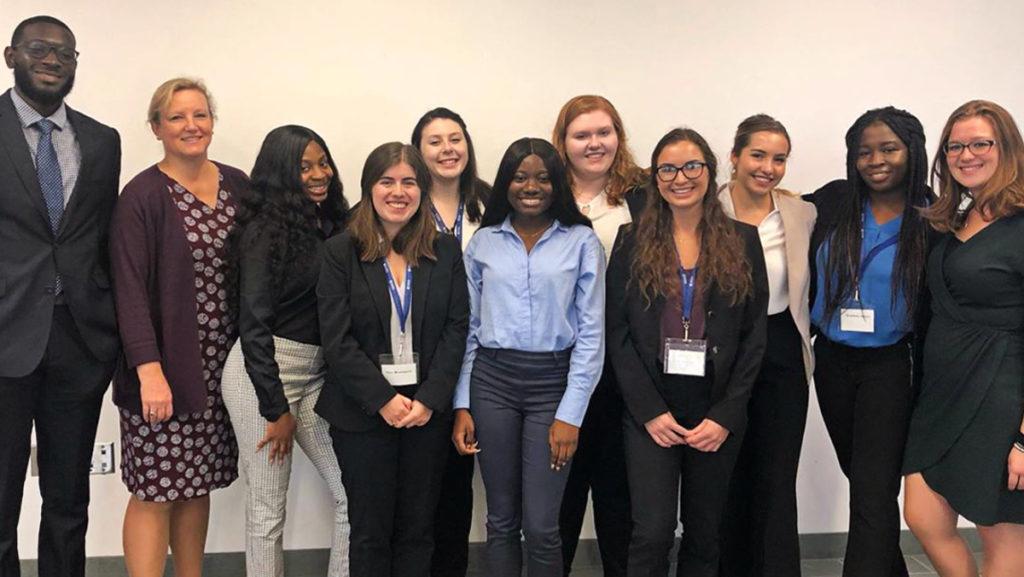A group of Ithaca College students won first and second place at the first Pennsylvania State University Health Care Management Case Study Competition after creating a way to encourage patients to use regional pharmacies.
Competitors received a case about the Geisinger health care system, a regional health care provider in Pennsylvania. The goal was to get customers to use Geisinger’s pharmacies rather than competing pharmacies, like larger companies such as CVS Pharmacy and Walmart. The winning team — comprised of seniors Temilola Adeoye and Lucy Hemingway and junior Emily McNally — proposed a solution of using patient navigators to connect Medicare patients to the pharmacy. Patient navigators are health professionals that help guide patients through the health care system and work to overcome obstacles that are in the way of the patient receiving the care and treatment they require.
Three teams from the college participated in the competition and senior Tessa Perchansky took home the Spirit of Competition award. The teams traveled to Penn State in Centre County, Pennsylvania, for the two–day competition Oct. 25 and 26. The first–place winning team received an award of $1,800, and the second–place team received a $900 award. The second–place team was comprised of juniors Nabintou Toure and Rasheedat Ibrahim and Perchansky. Another team of students from the college — comprised of seniors Jamie Loughney, Oluwashina Aliweri and Jenna Gooch — participated as well.
The winning team’s original idea involved making an app to create an easier way for patients to connect to the pharmacy, Hemingway said. She said the group then realized the idea might have been done already, leading them to coming up with the solution of using patient navigators. Adeoye said the team came up with a plan that would give doctors and patients free access to a patient navigator if they enrolled in the plan the team created. This plan required them to use Geisinger’s pharmacy.
On the first day of the competition, the students received the case at 8 a.m. The teams had approximately 16 hours until their midnight deadline. Hemingway said the biggest challenge was the limited time to come up with a solution.
“You just learn to roll with the punches,” Hemingway said. “I think that was a major factor. … After we submitted our presentation at the midnight deadline, I think we all just took that sigh of relief that we accomplished it and focused on getting sleep for the next morning.”
After the teams came up with their solutions and submitted their presentations, they were given times to present for 15 minutes in front of a panel of judges the next day. Employees of Geisinger were also on the panel and watched the teams present.
“It was interesting to hear [Geisigner] afterwards talk about the competition,” Adeoye said. “They were like, ‘Yeah, you all came up with ideas that were out of the box and really creative.’ It was nice to hear that from people in our field.”
Perchansky was the recipient of the Spirit of Competition award, which went to a student who exemplified a prepared, professional, confident and well-prepared presentation and prowess in answering the judges’ questions.
Perchansky said she thought the wide range of classes she has to take as a health sciences major prepared her for the competition.
“I had never been challenged that way before, and I think that it really allowed me to develop single skills working under pressure,” Perchansky said. “It really did a nice job in preparing me to look at things from many different angles.”
Penn State held the competition to provide an opportunity for undergraduate and graduate teams to experience a case competition in a more condensed format and for students from other schools to gain exposure to Penn State’s Master of Health Administration program, said Maureen Jones, associate teaching professor in the Department of Health Policy and Administration at Penn State.
The other teams were comprised of graduate and undergraduate students from Penn State, the University of Pittsburgh and the University of Scranton.
Penn State reached out to Ithaca College to participate in the competition, said Karen Edwards, associate professor in the Department of Health Promotion and Physical Education. Although it was a health care competition, the team also included Gooch, an integrated marketing communications major in the Roy H. Park School of Communications. Edwards said her department notified departments from the college outside of the health sciences about the competition because health care education benefits from an interdisciplinary approach.
Along with Edwards, Stewart Auyash, associate professor and chair of the Department of Health Promotion and Physical Education, and Christina Moylan, associate dean of the Department of Health Promotion and Physical Education, worked with the students in preparation for the competition.








